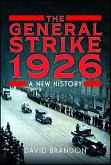The General Strike was one of the most significant events in twentieth century Britain. The miners were locked out and the mass of rank-and-file trade unionists then came out on strike in their support. With their families and some middle-class sympathizers, the miners and the labor and trade union movement found itself pitched against the political establishment, the apparatus of the state, the powerful mineowners backed by the Conservative Government and most of the media of the time in what was the sharpest form of class conflict short of political revolution. It had always said that the British didn't do general strikes. In 1926 they certainly did!2026 will mark the one-hundredth anniversary of the General Strike and, under the very different economic, social and political conditions of post-industrial, post-Brexit Britain, it is worth revisiting and examining the complicated coming together of factors which were eventually to lead to those extraordinary days in May 1926 when the fate of the nation lay in the balance.The author examines the economic, social and political processes taking places from the mid-nineteenth century and argues that this major confrontation between labor and capital was probably inevitable. He examines particularly the symbiotic relationship between the coal miners and the railway workers and the troubled industrial relations in those industries. His informed and lucid account should interest students of modern British history, labor history and the fortunes of the railways in this period.
Dieser Download kann aus rechtlichen Gründen nur mit Rechnungsadresse in A, B, BG, CY, CZ, D, DK, EW, E, FIN, F, GR, HR, H, IRL, I, LT, L, LR, M, NL, PL, P, R, S, SLO, SK ausgeliefert werden.









